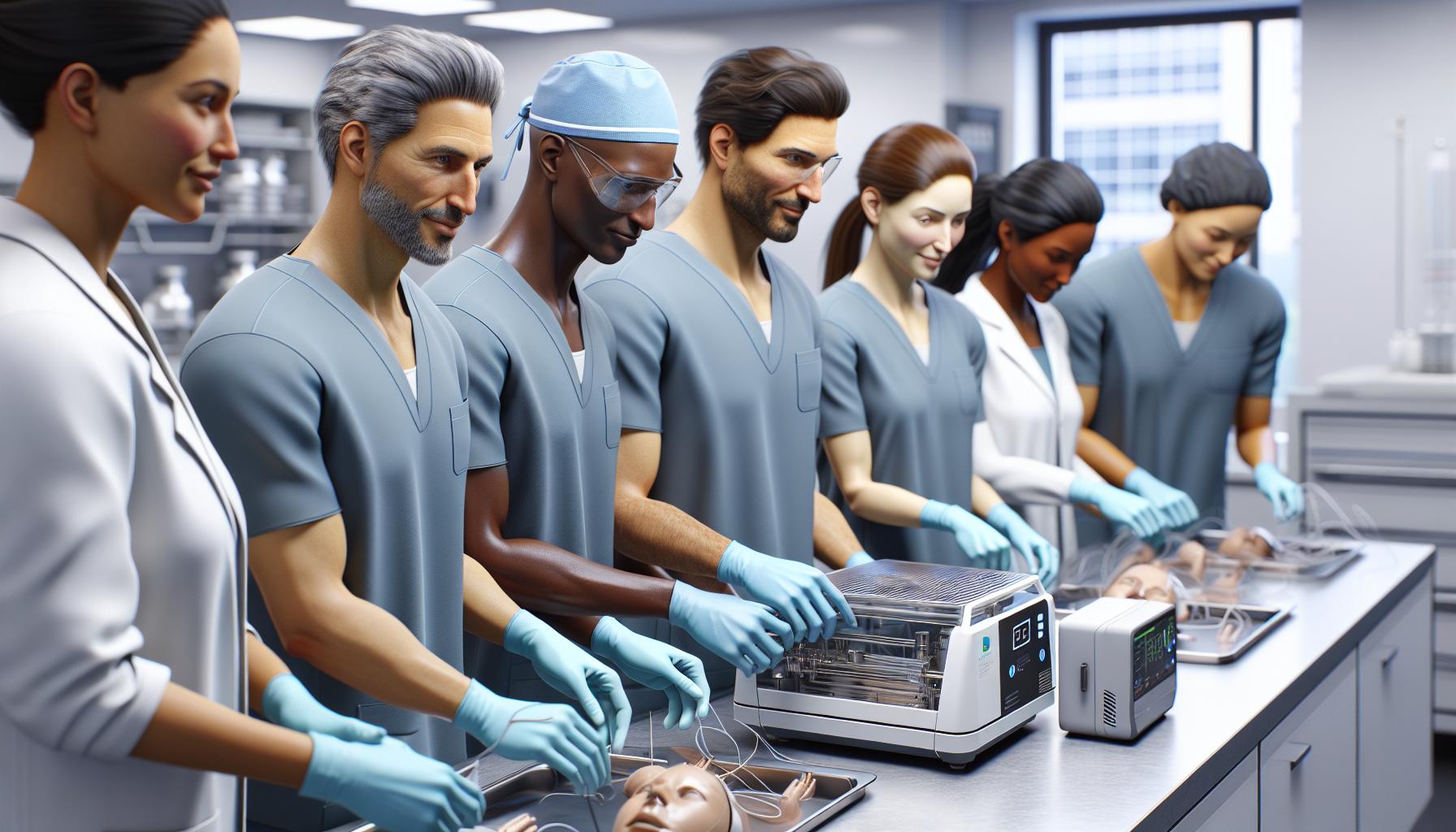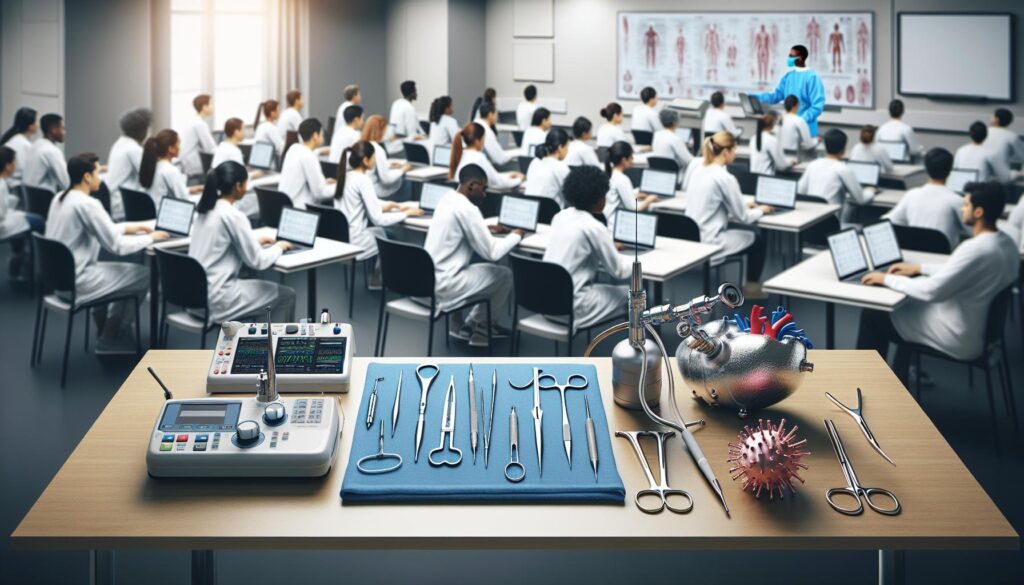Becoming a sterile processing technician offers a rewarding career path in healthcare without requiring extensive medical training. As technology advances more aspiring professionals wonder if they can complete their sterile processing certification entirely online. While some aspects of sterile processing education can be completed through virtual learning platforms the field requires hands-on training to master crucial skills. Students need practical experience in sterilization techniques medical instrument handling and infection control protocols. Today’s innovative education programs often combine online coursework with in-person clinical training to provide comprehensive preparation for this essential healthcare role.
Can You Become a Sterile Processing Tech Online
A sterile processing technician decontaminates sterilizes medical equipment essential for patient procedures surgeries. These healthcare professionals work in dedicated sterilization departments within hospitals clinics surgical centers.
Key responsibilities of sterile processing technicians include:
- Operating sterilization equipment including autoclaves ultrasonic cleaners washer-disinfectors
- Inspecting medical instruments for cleanliness functionality defects
- Assembling surgical instrument trays according to standardized procedures
- Maintaining detailed records of sterilization cycles equipment processing
- Following strict infection control protocols safety guidelines
- Managing inventory of surgical supplies sterile equipment
Sterile processing technicians collaborate with multiple departments:
- Operating Room Teams
- Surgical Staff
- Central Supply
- Infection Control
- Biomedical Engineering
- Materials Management
| Required Skills | Technical Knowledge |
|---|---|
| Attention to Detail | Sterilization Methods |
| Manual Dexterity | Medical Terminology |
| Physical Stamina | Infection Control |
| Organization | Equipment Operation |
| Communication | Safety Protocols |
The role requires certification from recognized organizations such as:
- Certification Board for Sterile Processing Distribution (CBSPD)
- International Association of Healthcare Central Service Material Management (IAHCSMM)
- Healthcare Sterile Processing Association (HSPA)
These professionals maintain critical safety standards in healthcare settings through proper sterilization decontamination practices ensuring patient safety infection prevention.
Online Education Options for Sterile Processing

Online education for sterile processing technicians combines virtual learning with practical training components. Educational platforms offer flexible study options that accommodate various learning schedules while meeting industry certification requirements.
Self-Paced Virtual Training Programs
Online sterile processing programs deliver theoretical coursework through digital platforms such as:
- Interactive modules covering medical terminology terminology
- Video demonstrations of sterilization techniques
- Virtual simulations of instrument identification
- Digital assessments with immediate feedback
- Recorded lectures from industry experts
Leading certification bodies offer approved online courses that include:
| Program Component | Duration | Format |
|---|---|---|
| Core Curriculum | 10-12 weeks | Virtual |
| Exam Preparation | 4-6 weeks | Online |
| Practice Tests | Self-paced | Digital |
Hybrid Learning Opportunities
Hybrid programs combine online theoretical training with in-person clinical experience:
- Virtual classroom sessions for foundational knowledge
- Hands-on training at partner healthcare facilities
- Supervised practice with sterilization equipment
- Direct mentoring from certified professionals
- Laboratory sessions for instrument handling
| Component | Hours Required | Setting |
|---|---|---|
| Clinical Rotation | 400 hours | Hospital |
| Lab Practice | 120 hours | Training Center |
| Equipment Training | 80 hours | Medical Facility |
Key Requirements for Certification
Sterile processing certification demands specific educational qualifications professional training hours to meet industry standards. The certification process includes both academic prerequisites specialized hands-on experience.
Education Prerequisites
- High school diploma or GED equivalent
- Completion of an accredited sterile processing program (12-24 months)
- Basic computer literacy skills
- Knowledge of medical terminology anatomy physiology
- Coursework in:
- Microbiology fundamentals
- Infection prevention control
- Sterilization techniques methods
- Surgical instrument identification
- Inventory management systems
| Program Component | Duration | Format |
|---|---|---|
| Core Coursework | 400-600 hours | Online/Hybrid |
| Laboratory Training | 100-200 hours | In-person |
| Clinical Rotations | 400+ hours | On-site |
- 400 minimum documented clinical hours
- Hands-on practice with sterilization equipment
- Direct experience in:
- Decontamination procedures
- Instrument assembly verification
- Sterilizer operation maintenance
- Quality assurance testing
- Documentation compliance
- Completion of supervised case logs
- Performance evaluations by certified preceptors
- Demonstrated competency in standard operating procedures
- Documentation of required skill checkoffs
Top Online Sterile Processing Programs
Leading healthcare institutions partner with education providers to deliver comprehensive online sterile processing programs. These programs combine virtual learning with hands-on clinical experience to prepare students for certification exams.
Program Costs and Duration
Online sterile processing programs range from $1,500 to $4,000 for complete certification preparation. The duration spans 3-12 months based on the following factors:
| Program Component | Duration | Cost Range |
|---|---|---|
| Core Coursework | 12-16 weeks | $800-$1,500 |
| Clinical Rotations | 8-12 weeks | $500-$1,500 |
| Lab Training | 4-6 weeks | $200-$1,000 |
| Certification Exam Prep | 2-4 weeks | Included |
Students complete 400-600 hours of online instruction plus 400+ hours of clinical practice. Payment plans split costs into monthly installments of $150-$400.
Accreditation Standards
Accredited online sterile processing programs meet stringent quality benchmarks established by recognized organizations:
- CAAHEP (Commission on Accreditation of Allied Health Education Programs) validates curriculum standards
- ASHP (American Society of Health-System Pharmacists) reviews clinical training components
- IAHCSMM certifies program compliance with industry regulations
- State boards of education approve distance learning platforms
Approved programs incorporate:
- Interactive medical terminology modules
- Virtual anatomy labs
- Infection control simulations
- Equipment operation tutorials
- Digital documentation systems
- Professional ethics training
Each program undergoes annual audits to maintain accreditation status. Clinical sites require separate approval through healthcare facility partnerships.
Career Outlook and Advancement
The sterile processing technician field demonstrates strong growth potential with a projected 6% employment increase from 2021 to 2031. Healthcare facilities across the United States employ over 63,000 sterile processing technicians, with continuing demand in hospitals, surgical centers, dental clinics.
| Career Statistics | Data |
|---|---|
| Median Annual Salary | $41,480 |
| Job Growth Rate | 6% |
| Entry-Level Positions | 63,000+ |
| Average Experience Bonus | $2,500-$5,000 |
Career advancement opportunities include:
- Advancing to lead technician roles after 2-3 years of experience
- Moving into sterile processing department management positions
- Specializing in surgical instrument coordination
- Transitioning to infection prevention specialist roles
- Taking on training coordinator responsibilities
Professional development paths feature:
- Obtaining advanced certifications from IAHCSMM or CBSPD
- Completing specialized instrument handling endorsements
- Earning management credentials in healthcare sterile services
- Gaining expertise in robotic surgical instrument processing
- Developing skills in department operations supervision
Geographic location impacts earning potential:
- Urban hospitals offer 15-25% higher salaries
- Teaching hospitals provide additional education benefits
- Travel technician positions pay premium rates
- Regional medical centers include performance bonuses
- Specialized surgical facilities offer competitive compensation
The field rewards continuous education with salary increases of $2,500-$5,000 for each additional certification. Experienced technicians who pursue management roles see salary increases of 30-40% compared to entry-level positions. Becoming a sterile processing technician through online education is possible but requires a balanced approach combining virtual learning with hands-on training. Today’s technology enables aspiring professionals to complete theoretical coursework remotely while gaining essential practical experience through clinical rotations. The field offers stable career prospects with competitive salaries and numerous advancement opportunities. With the healthcare industry’s continued growth and the increasing demand for skilled sterile processing technicians qualified candidates can look forward to rewarding careers in this vital healthcare role. Dedicated individuals who complete accredited programs and obtain proper certification will find themselves well-positioned to succeed in this essential healthcare profession. The combination of online learning flexibility and practical training creates an accessible path to this rewarding career.



